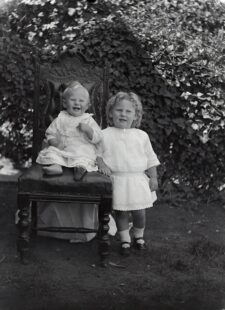Common Birth Order Traits
Christian Counselor Spokane
Were you an only child, or did you grow up with lots of brothers and sisters? According to many psychologists, your answer to that question may explain the origin of some of your personality traits, based on common birth order traits.
 Austrian physician and psychotherapist Alfred Adler posited that the order in which a child is born into his or her family shapes his or her development and personality and has a significant effect on the outcome of his or her life. This is due to the changing family dynamics with the addition of each new sibling.
Austrian physician and psychotherapist Alfred Adler posited that the order in which a child is born into his or her family shapes his or her development and personality and has a significant effect on the outcome of his or her life. This is due to the changing family dynamics with the addition of each new sibling.
For example, new parents bringing their first child home from the hospital may be anxious about doing everything right and be overly obsessed with the smallest details. This includes sanitizing their baby’s pacifier every time it falls on the floor, or immediately attending to every whimper. As they become more comfortable taking care of their infant, however, their anxiety decreases.
When the next baby is born, the parents are more relaxed. They no longer sanitize the pacifier every time it falls, and they may let their child cry a little longer before running to pick him or her up. By the time the youngest child is born, the older children have become part of helping with the needs of the younger ones.
Following is a list of common birth order traits. Keep in mind though that they are not written in stone. They can be affected by several variables such as family size, age gaps between siblings, gender, or the death or illness of one of the children.
Common birth order traits.
Oldest child.
The oldest child is the only child who experiences life without siblings and who has the full attention of his or her parents. He or she is the child with whom mom and dad first learn how to parent.
Parents of the oldest child are new to the job and tend to be more anxious and perfectionistic about raising him or her than they are with any of their other children. They also tend to be stricter with him or her and to hold him or her to higher standards.
As other children are born into the family, the oldest child is given responsibilities such as helping with chores, feeding the baby a bottle, or playing with younger siblings to keep them entertained. He or she is also expected to set a good example for younger brothers and sisters, which often leads him or her to feel protective of them and to act like a second parent.
Common traits associated with the oldest child are:
- Responsible.
- Reliable.
- Conscientious.
- Determined.
- Goal-oriented.
- Highly motivated to succeed.
- Observant.
- Rule follower.
- Dutiful.
- Structured.
- Controlling.
- High achiever.
- Leadership skills.
- Independent.
- Hard worker.
- Bossy.
- Perfectionist.
- Inflexible.
- Overly cautious.
- Afraid to take risks.
- Seeks the approval of people in charge.
As adults, the oldest children tend to be self-confident, ambitious, conservative, have good analytic skills, make decisions based on logic, and like rules and guidelines. They are natural leaders who like making decisions on their own and have trouble delegating work to others.
Statistically, oldest children are more likely to attain higher levels of education, earn higher incomes than their younger siblings, and pursue higher-ranking positions such as CEOs, legislators, senior government officials, scientists, or astronauts.
Middle child.
The middle child never knows what it’s like to have his or her parents’ undivided attention. From the beginning, he or she shares everything with his or her older sibling(s). Then, as the family expands, he or she goes from being the youngest to becoming an older brother or sister, and a middle child.
Parents may become less attentive now that there are other children to take care of, and the middle child may feel left out or forgotten. He or she may try to carve out a niche for himself or herself by being a people pleaser, rebellious, trying to outdo his or her older siblings, or finding creative ways to be noticed.
There can be multiple middle children in a family.
Common traits associated with the middle child are:
- Adaptable.
- Easygoing.
- Friend oriented rather than family oriented.
- Outspoken.
- Open to new experiences.
- Creative.
- Rebellious.
- Insecure.
- Secretive.
- Competitive.
- Negotiating skills.
- Resourceful.
- Social.
- People-pleaser.
- Dislikes conflict.
- Peacemaker.
- Willing to compromise.
As adults, middle children can read people well and see all sides of a situation. They tend to be easygoing, diplomatic, creative, good teammates and have excellent people skills. Together with their esteem of fairness and justice and their willingness to compromise, this skill set makes them great advocates, peacemakers, and negotiators. Often, they pursue fields such as nursing, law enforcement, first responders, and information technology.
 Whatever they do, middle children are likely to do it more graciously and agreeably than their older or younger siblings, and they are also the most likely to be satisfied with their jobs.
Whatever they do, middle children are likely to do it more graciously and agreeably than their older or younger siblings, and they are also the most likely to be satisfied with their jobs.
Youngest child.
By the time the youngest child is born, parents tend to be more lenient and laid-back, so the youngest child tends to be more relaxed than his or her siblings as well.
With older brothers and sisters becoming less reliant on their parents, the youngest child usually get extra attention, is often coddled by his or her parents, and is not held to the same standards as his or her older siblings when it comes to rules and chores.
On the other hand, the youngest child may feel that nothing he or she does is important because none of his or her accomplishments such as learning how to talk, walk, or read are original. His or her siblings have already learned to do those things before him or her, and so his or her parents are not as excited or impressed when he or she achieves the same milestones.
Common traits associated with the youngest child are:
- Easy going.
- Funny.
- Entertaining.
- Likeable.
- Attention seeking.
- Creative.
- Agreeable.
- Outgoing.
- Dependent.
- Boisterous.
- Fun loving.
- Spoiled.
- Charming.
- Free-spirited.
- Self-centered.
- Adventurous.
- Manipulative.
- Persistent.
- Undisciplined.
As adults, the youngest children often become entrepreneurs. They tend to live in the moment rather than focus on the future and may be financially irresponsible. In business, they are more likely to reinvent a company rather than just improve it and have a tendency to take risks.
Youngest children like to entertain, be the life of the party, and make people laugh. They often gravitate toward artistic and outdoor jobs and are more likely than their brothers or sisters to become writers, artists, or comedians. They are also successful in fields such as advertising, athletics, and sales.
 Only child.
Only child.
The only child gets much more attention from his or her parents than children with siblings do, and shares many of the same traits as the oldest child. Since most of his or her interactions are with adults, he or she often acts like a mini-adult and seems mature for his or her age.
Parents of an only child may be overprotective of him or her and have high expectations that can lead him or her to feel pressured as he or she tries to live up to them.
Common traits associated with the only child are:
- Mature.
- Independent.
- Confident.
- Diligent.
- Responsible.
- Overachiever.
- Natural born leader.
- Conservative.
- Controlling.
- Ambitious.
- Intelligent.
- Creative.
- Stubborn.
- Self-centered.
- Trouble compromising.
- Struggles with criticism.
- Doesn’t like to share.
- Gets along better with adults than peers.
As adults, only children usually achieve higher educational goals, occupy jobs with greater prestige, and earn higher incomes than their brothers and sisters. They tend to pursue vocations such as medicine, engineering, law, or senior management positions.
If you are facing challenges and/or have questions about birth order traits and their effect on your personality, please give us a call. A Christian counselor can help you understand your birth order traits and overcome any problems you may now be experiencing related to your birth order.
References:
Jeffrey Kluger. “How Your Birth Order Affects Your Odds of Success.” Time. April 8, 2016. time.com/4286120/siblings-day-success-career/.
Jocelyn Voo. “Does Birth Order Determine Your Child’s Personality?” Parents. Updated June 26, 2023. parents.com/baby/development/social/birth-order-and-personality/.
Molly Owens. “The Surprising Ways Your Birth Order Impacts Your Personality Type.” Truity. February 12, 2019. truity.com/blog/birth-order-and-personality-study.
Rachel Zupek. “Can birth order determine your career?” CNN.com. cnn.com/2008/LIVING/worklife/10/22/cb.birth.order.career/index.html.
WebMD Editorial Contributors. “What to Know About Birth Order.” WebMD. Reviewed June 28, 2021. webmd.com/parenting/what-to-know-about-birth-order#.
Photos:
“Making Cookies”, Courtesy of Yunus Tuğ, Unsplash.com, Unsplash+ License; “Brothers”, Courtesy of Max Titov, Unsplash.com, CC0 License; “Sisters”, Courtesy of Museums Victoria, Unsplash.com, CC0 License; “Young Band”, Courtesy of Robert Collins, Unsplash.com, CC0 License





